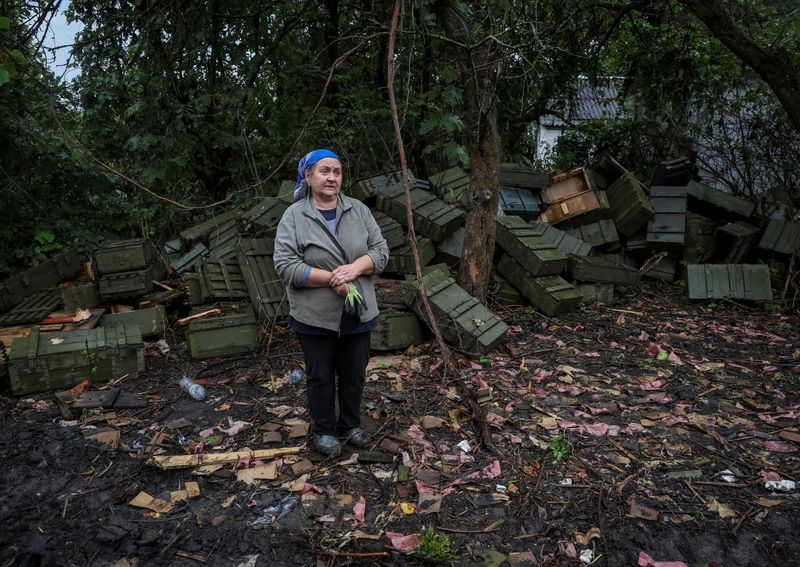Residents begin clean-up in re-captured Ukrainian village
2022.09.16 11:46
2/2

© Reuters. A local resident Olena Kushnir stands in front of ammunition boxes near her destroyed house, amid Russia’s attack on Ukraine, in the village of Nova Husarivka, recently liberated by Ukrainian Armed Forces, in Kharkiv region, Ukraine September 15, 2022. R
2/2
NOVA HUSARIVKA, Ukraine (Reuters) – When Olena Kushnir was allowed to walk freely into her property for the first time after the Ukrainian army recaptured the village of Nova Husarivka from Russian forces, she found an unexploded shell lying in her tomato fields.
“I showed it to the boys yesterday, they took a picture and said the demining units would come,” the 55-year-old said.
Nova Husarivka, a village of less than 1,000 residents in Ukraine’s northeastern Kharkiv region, was under Russian occupation for over six months before it was recaptured by Ukraine in early September as a part of a lightning offensive.
Ukraine said earlier this week that it had liberated 3,800 square kilometres (1,500 square miles) of territory in the Kharkiv region since Sept. 6. The offensive forced Moscow to abandon its main bastion in northeastern Ukraine, marking its worst defeat since the early days of the war.
Kushnir and her family fled only two weeks before the village was recaptured. Before that the Russians had prevented them from leaving, and when they finally let them go, allowed them only to go to Russian-held territory.
“We were afraid and had to leave, because it was impossible to live here,” Kushnir said.
Since returning home, she and the other residents of Nova Husarivka have been repairing what they can of their damaged properties. They are also having to deal with remnants of the Russian occupiers that are still scattered around their village, including piles of ammunition boxes, stacks of artillery shells, abandoned uniforms, and fuel provisions.
Among the residents waiting for demining units was Vitalii Orlov. The 30-year-old entrepreneur said he had found that much of the equipment from his grains business had been stolen.
“Anything you can lift, carry and send back home they took. There’s nothing left, except wood, wheat and old equipment. Devastation,” he said, standing inside a grain store with walls pockmarked by shelling.
“I’m waiting for them to de-mine everything so it’s safe to load on. Then I’ll send it all (the wheat) out for reprocessing or drying,” he said. “We’ll come up with something. The country won’t starve.”
Standing outside her severely damaged home, Olha Nemashkina, a teacher in the village, was hanging laundry in garden filled with debris.
“There was a pear tree. Everything that used to be here is now burnt.” she said.








